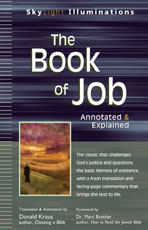"The critique of the world as it stands — and the furious, though futile, defense of moral order that is waged by Job's friends — implies a vision of how the world should work. That vision essentially says that if you worship God (and not any other power or any idol); if you are charitable with whatever wealth you may possess or earn; if you raise your children to be respectful and pious themselves; if you side with the poor and oppressed, feed the hungry, clothe the naked, and house the homeless — if you live in this way, you will be rewarded (or should be) with long life, prosperity, a happy family, and social honors and deference. We can leave aside the objection that if everyone were moral and therefore prosperous, there would be no oppressed or poor people to whom we could be charitable. The point of the vision is not to describe what would happen, but what ought to happen. Instead, we can ask ourselves: Well, if the world worked that way, what would it mean?
"It would mean, among other things, that a guaranteed way to gain a long life, a happy family, and wealth for yourself and your offspring is to act in certain ways. Acting charitably and relieving distress would, in essence, be a sure way to gain prosperity. For at least some of us, therefore, helping the hungry and homeless wouldn't be something we do because it is ethical and right, but because it would make us rich, happy, and long-lived. The danger of a universe like that, set up to reward virtuous behavior with positive consequences, is to make virtuous behavior a matter of self-interest rather than of character. In other words, we would act virtuously not because virtue is good in itself and we should practice it no matter what the consequences, but because virtue would result in a good external to itself.
"Ultimately, then, the critique of the book of Job, though it starts out by saying that life is unfair, turns into a much deeper critique — one that asks why we want life to be fair. Do we value fairness for its own sake? Or do we want fairness to result in something else that we value more, which is wealth, happiness, and a long life?
"The theological point of the book of Job, therefore, if it can be said to have a theology, is to make us aware of the impossibility of creating a moral universe that at one and the same time would bring us to desire goodness for its own sake and reward us extrinsically for being good. This is the book of Job's unique moral insight. Acting justly and generously can, of course, end up benefiting the person who acts as well as those who benefit from such behavior. But it cannot invariably do so without the unintended consequence that we will act in virtuous ways for the sake of rewards that have nothing to do with virtue. Even God cannot square that circle."
